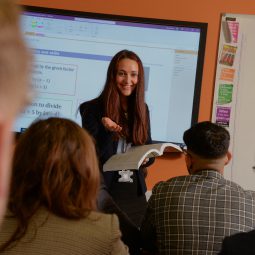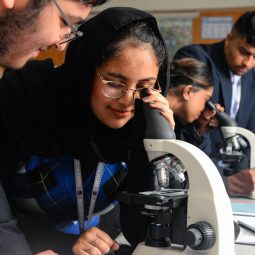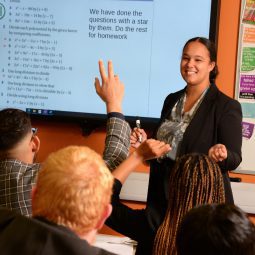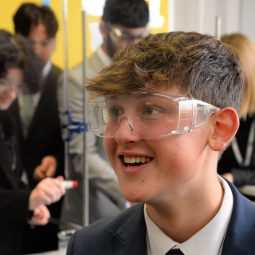Physics
Physics (AQA)
Physics is at the heart of everything – making it the basis of all modern science and technological developments.
You’ll delve inside the nucleus to discover sub-atomic particles, consider the true nature of light and how its properties may be exploited, and develop a deeper understanding of the laws of physics underpinning the workings of the universe.
It’s a course to develop your imagination, investigative skills and mathematical ability – attributes that are recognised as an asset for a successful career in any field.
We strongly suggest that if you choose to study Physics at A-level you also consider studying Maths as this will help with your studies.
Course Content & Assessment
In following sections you will be introduced to the fundamental properties and nature of matter and radiation.
You will learn about quantum phenomena and develop previous GCSE studies on electrical phenomena.
You will also develop your understanding of forces, momentum and energy. Learning how materials behave under stress and discover more about wave behaviour.
There are required practical activities throughout the year that cover a wide range of the topics above.
There will be no separate investigative skills assessment it will be tested within the other exams.
Core content (compulsory units)
- Measurement and their errors
- Particles and radiation
- Waves
- Mechanics and materials
- Electricity
- Further mechanics and thermal physics
- Fields and their consequences
- Nuclear physics
- Astronomy
Assessment:
There are 3x 2 hour-papers to sit at the end of Y13:
Paper 1:
Assesses sections 1-5 and 6.1 (Periodic motion).
This paper represents 34% of their A level and it’s worth 85 marks, 60 of which will be short and long answer questions and 25 multiple choice.
Paper 2:
Assesses sections 6.2 (Thermal Physics), 7 and 8, and assumes knowledge of sections 1-6.1.
This paper represents 34% of their A level and it’s worth 85 marks, 60 of which will be short and long questions and 25 multiple choice on content.
Paper 3:
Assesses practical skills and data analysis in Section A and the optional topic chosen out of 9-13 in Section B.
It is worth 32% of their A level and will have 80 marks, of which 45 will be short and long answer questions on practical experiments and data analysis and 35 will be short and long answer questions on the optional topic.
Teaching
Lessons will be varied and allow students to work both independently and within groups. Students may lead some parts of lessons as well as share in the assessment of their own work and that of their peers. Subject matter will be placed in context wherever possible so that you can see how physics relates to real life.
Your Future
Physicists are in demand throughout the world. A Physics A-level can open the doors to many different careers; from teaching, through industrial applications, to the healthcare professions. The skills, knowledge and understanding developed during the course make the qualification highly desirable for medics and essential for all kinds of engineers.
The qualification can lead to pure Physics at university or a specialist degree such as Physics with Astrophysics.
The Blue Coat Sixth Form is proud to be part of the Cranmer Education Trust
Cranmer Education Trust is a company limited by guarantee and an exempt charity registered in England. Company registration number: 07687709. Registered Office: Cranmer Education Trust, c/o The Blue Coat School, Egerton Street, Oldham OL1 3SQ. The website address is www.cranmereducationtrust.com and the phone number 0161 785 5082.









